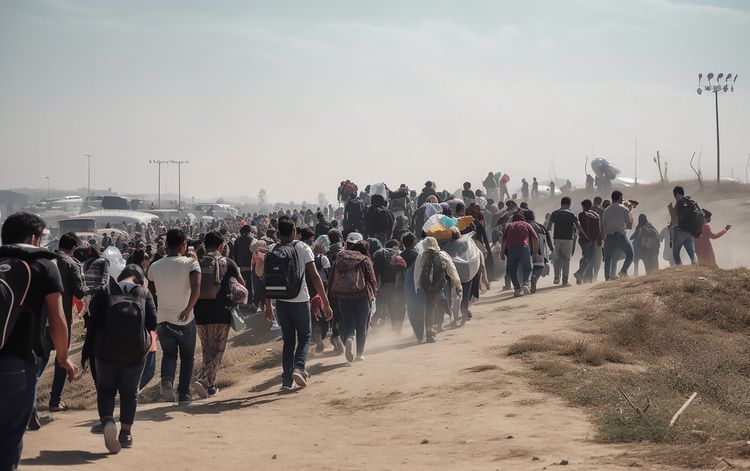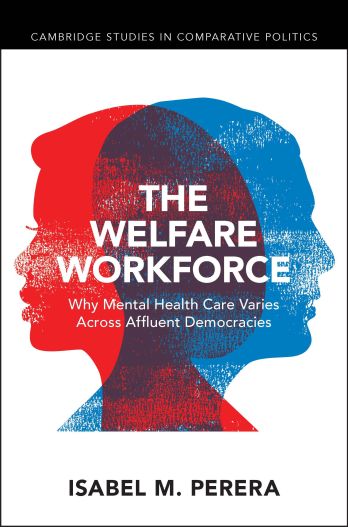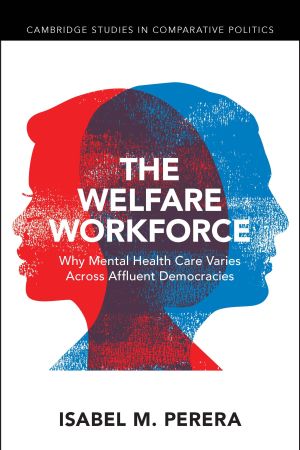Institute for European Studies
From Where We Stand

March 18, 2025
2:30 pm
Uris Hall, G08
Film Screening of "From Where We Stand" and discussion with Lucy Kaye and Adrian Favell
Lucy Kaye's one hour documentary and deep dive into the life and times of residents of three post industrial towns in the North of England is at once moving, visually haunting, and (in parts) disturbingly raw. It is part of a 4 year project run at the University of Leeds which took a sociological look at political disaffection -- and issues of austerity, deprivation, race and nation -- in the North of England after Brexit and during COVID.
With a direct and spontaneous approach, filmmaker Lucy Kaye creates intimate portraits of diverse individuals in three post-industrial northern English towns. Through the stories of people connected by place, the film explores our relationship with where we’ve come from, what we’ve left behind and where we live. Amongst the people we meet are Bini, a former asylum seeker from Eritrea trying to root himself in Middlesbrough; Stella, a Polish woman stuck in the UK after a relationship breakdown, making a life for herself and her daughter; and Yan, a former power station worker enveloped in nostalgia for the past. We also get to know Yubi, a Pakistani immigrant mourning the passing of his father in Wakefield; and Lisa, another Halifax resident determined to make sure the voices of her community are heard. In pared-back verité style that deploys music and lingering shots of the landscapes that define these lives, From Where We Stand offers the people portrayed time and space to express how they feel about their lives and their towns.
Background:
From Where We Stand is made in collaboration with the Northern Exposure research project at the University of Leeds. Adrian Favell, is Director of the Radical Humanities Laboratory at University College Cork and is PI of the Northern Exposure Project at University of Leeds. The research explores notions of identity, place and disaffection in post-industrial towns in the North of England after Brexit. More information can be found here: https://northernexposure.leeds.ac.uk/.
https://fromwherewestand.co.uk/
Host
Institute for European Studies
Cosponsors
Sociology
Migrations
Additional Information
Program
Einaudi Center for International Studies
Institute for European Studies
Migrations Program
The Orders and Borders of Global Inequality: Rethinking Migration and Mobilities in the Era of Neoliberalism and Beyond

March 17, 2025
4:30 pm
Uris Hall, G08
In a world of massive inequalities between nations, and where citizenship at birth is the biggest determining factor of anyone's life chances, migration and international mobility are often seen as dramatic mechanisms of change. Yet strict borders and hierarchies between nations persist. The recently initiated five year ERC Advanced Grant project, MIGMOBS - The Orders and Border of Global Inequality: Migration and Mobilities in Late Capitalism (2024-28) investigates how and why global inequalities are reproduced through the shifting classification of mobile populations. In opening a new vision by seeing "international migration" as only a narrow and symbolically overcharged slice in a continuum of "mobilities", both human and non-human, it effects a paradigm shift in conventional migration studies, in both theoretical and operational terms. Building a global database with case studies across 23 sending and receiving countries, MIGMOBS charts how nation-states have preserved power through the era of neoliberalism by selectively opening and closing channels of mobility: making immigration and asylum the obsessive target of sovereign control while rendering invisible and fluid the mass mobilities of tourism, students, business and commuter travel. For more information, contact the PI, Adrian Favell (adrian.favell@ucc.ie), or see: https://www.ucc.ie/en/migmobs
Adrian Favell is Professor of Social and Political Theory and Director of the Radical Humanities Laboratory, University College Cork. He directed the Bauman Institute at the University of Leeds, and was also Professor at Sciences Po, Paris, Aarhus University and UCLA. He is the author of various works on migration, multiculturalism, cosmopolitanism and cities, notably a recent book with Polity Press (2022) The Integration Nation: Immigration and Colonial Power in Liberal Democracies. He directs the ERC AdG Project MIGMOBS - The Orders and Border of Global Inequality: Migration and Mobilities in Late Capitalism (2024-28) . Website: www.adrianfavell.com
Host
Institute for European Studies
Cosponsors
Migrations Program, part of the Mario Einaudi Center for International Studies, and the Mellon Foundation’s Just Futures Initiative
Comparative Muslim Societies Program
Sociology
Additional Information
Program
Einaudi Center for International Studies
Institute for European Studies
Migrations Program
The Welfare Workforce

Book by IES Faculty Associate, Isabel Perera
“The Welfare Workforce: Why Mental Health Care Varies Across Affluent Democracies,” an open-access book by Isabel Perera (IES), compares public mental health care in the U.S. and beyond.
The Welfare Workforce is a thought-provoking exploration of mental health care in the United States and beyond. Although all the affluent democracies pursued deinstitutionalization, some failed to provide adequate services, while others overcame challenges of stigma and limited resources and successfully expanded care. Isabel M. Perera examines the role of the “welfare workforce” in providing social services to those who cannot demand them. Drawing on extensive research in four countries – the United States, France, Norway, and Sweden – Perera sheds light on post-industrial politics and the critical part played by those who work for the welfare state. A must-read for anyone interested in mental health care, social services, and the politics of welfare, The Welfare Workforce challenges conventional wisdom and offers new insights into the complex factors that contribute to the success or failure of mental health care systems. This title is also available as Open Access on Cambridge Core.
View here.
Additional Information
The Welfare Workforce: Why Mental Health Care Varies Across Affluent Democracies

By Our Faculty
The Welfare Workforce is a thought-provoking exploration of mental health care in the United States and beyond. Although all the affluent democracies pursued deinstitutionalization, some failed to provide adequate services, while others overcame challenges of stigma and limited resources and successfully expanded care. Isabel M. Perera examines the role of the “welfare workforce” in providing social services to those who cannot demand them.
Book
35.99
Additional Information
Program
Type
- Book
Publication Details
Publication Year: 2025
ISBN: 9781009499866
Ware Rotary Award for International Graduate Professional Development

Details
International students: Do you plan to travel to a U.S. conference or networking event related to your field of study?
The W. Barlow Ware Rotary Award for International Graduate Student Professional Development provides three awards annually to international graduate and professional students at Cornell. The awards ($650 maximum) support domestic travel and attendance costs for conferences or professional events promoting international graduate students' professional development.
Amount
Up to $650. Award recipients will have funds directly deposited through the Cornell Bursar system. Per U.S. Internal Revenue Service guidelines, 14% of the funds may be withheld for tax purposes.
Eligibility
Graduate students and students enrolled in Cornell’s professional schools are eligible. In addition, you must be:
- An international student with citizenship outside the United States (nonresident on a Cornell-sponsored student visa)
- Actively engaged with the Mario Einaudi Center for International Studies or one of our regional and thematic programs
Requirements
- In your application, you must clearly explain the value of your proposed conference or networking experience—as well as the alignment of your research or professional studies—with one or more of the Seven Rotary Causes:
- Promoting peace
- Fighting disease
- Providing clean water, sanitation, and hygiene
- Saving mothers and children
- Supporting education
- Growing local economies
- Protecting the environment
- Ware Rotary awards support domestic airfare or train/bus, hotel, and other associated costs for attendance at an event directly related to your dissertation, thesis research, or planned professional career.
- The proposed conference, meeting, or event must be held in the United States, with your travel beginning and ending in the U.S.
- You must attend the conference or event described in your application. Awards are not transferable.
- Travel must take place between March 1 and August 15, 2025, and cannot be funded retroactively.
Reporting
Post-event reporting is mandatory for all award recipients. By applying, you agree to complete the following reporting no later than August 29, 2025:
- Provide proof of event attendance, such as a registration email and a copy of the conference program.
- Provide a testimonial stating how your attendance benefited your professional development and promoted one or more of the Seven Rotary Causes.
- Photos of you attending your event are appreciated! Please sign this multimedia release before submitting photos.
Questions?
Additional Information
Funding Type
- Award
Role
- Student
Program
IES Luigi Einaudi Distinguished Lectures
Seeing Others: The Ongoing Challenges of Recognition Gaps in the United States and Europe | April 21, 2025
Luigi Einaudi Distinguished Lecture
Nuclear Colonialism and Its Discontents

February 6, 2025
12:00 pm
Nuclear weapons and associated technologies have been primarily developed by and for Global North nations, often using the labor and natural resources of indigenous populations around the world, and often doing violence to those populations and their environments. As a result, many scholars analyze the development of nuclear technologies–including uranium mining, the processing and production of fissile materials, nuclear weapons testing, and use–as a form of colonialism. But as a state-centric framework, colonialism does not always capture practices that transcend national boundaries; radioactivity does not respect borders. This panel will elucidate the uses and limitations of the colonial framework for understanding the social and political implications of nuclear technologies. The panel will discuss how nuclear technologies have been developed in ways that are both locally specific and globally-interconnected, and the implications of this history for social and environmental justice.
Virtual panel discussion with-
Vincent Intondi, PACS Domestic Affiliate Scholar
Myrriah Gomez, Associate Professor at University of New Mexico
Mary Mitchell, Assistant Professor at New Jersey Institute of Technology and Rutgers Newark
Magdalena Stawkowski, Assistant Professor at University of South Carolina
Hirokazu Miyazaki, Former Director of the Einaudi Center, Professor at Northwestern University
Register here.
Host
Reppy Institute for Peace and Conflict Studies
Additional Information
Program
Einaudi Center for International Studies
Reppy Institute for Peace and Conflict Studies
Institute for African Development
Institute for European Studies
East Asia Program
Latin American and Caribbean Studies
Information Session: Einaudi Center Undergraduate Opportunities

March 11, 2025
5:00 pm
Uris Hall, G08
Join us to learn about opportunities for undergraduate students with the Einaudi Center for International Studies! This session will discuss how to successfully apply for programs like Global Internships and Laidlaw Scholars, and how to discover or strengthen global interests, including academic minors, weekly seminars, and language study.
Can't attend? Email programs@einaudi.cornell.edu for more information.
Additional Information
Program
Einaudi Center for International Studies
Reppy Institute for Peace and Conflict Studies
East Asia Program
Southeast Asia Program
Latin American and Caribbean Studies
Institute for European Studies
South Asia Program
Migrations Program
Information Session: IES & PACS Undergrad and Grad Opportunities

February 18, 2025
3:00 pm
Uris Hall, G08
This session will describe opportunties for undergraduate and graduate students in the Institute for European Studies and the Reppy Institute for Peace and Conflict Studies.
IES offers a minor in European Studies, Global Summer Internships, a Graduate Fellows Program, and research funding for both undergraduate and graduate students. PACS offers fellowships, funding, and research travel grants for undergraduate and graduate students.
Register for virtual attendance here. Can't attend? Contact ies@cornell.edu or pacs@cornell.edu.
Additional Information
Program
Einaudi Center for International Studies
Reppy Institute for Peace and Conflict Studies
East Asia Program
Southeast Asia Program
Latin American and Caribbean Studies
Institute for African Development
Institute for European Studies
South Asia Program
Migrations Program
Information Session: Fulbright U.S. Student Program for Undergraduates

March 19, 2025
4:45 pm
The Fulbright U.S. Student Program supports U.S. citizens to study, conduct research in any field, or teach English in more than 150 countries. Students who wish to begin the program immediately after graduation are encouraged to start the process in their junior year. Recent graduates are welcome to apply through Cornell.
The Fulbright program at Cornell is administered by the Einaudi Center for International studies. Applicants are supported through all stages of the application and are encouraged to start early by contacting fulbright@einaudi.cornell.edu.
Register here. Can't attend? Contact fulbright@einaudi.cornell.edu.
Additional Information
Program
Einaudi Center for International Studies
Reppy Institute for Peace and Conflict Studies
East Asia Program
Southeast Asia Program
Latin American and Caribbean Studies
Institute for African Development
Institute for European Studies
South Asia Program
Migrations Program
